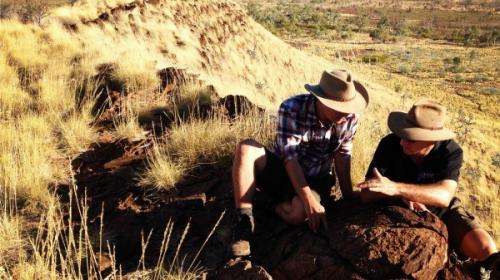Fossil find uncovers ancient evolutionary pattern

A fossil discovery in WA's northwest suggests that a family of microbes has persisted essentially unchanged for the past 2.3 billion years—half the age of Earth.
Australian and American scientists made the discovery when studying 1.8-billion-year-old chert and carbonate rocks in the Duck Creek formation, south of Paraburdoo in the Pilbara.
University of NSW astrobiologist Professor Martin Van Kranendonk says the Duck Creek fossils are almost identical to those found nearby that date 500 million years earlier and both are similar to modern microbes discovered in 2007 living off the coast of South America.
The discovery provides strong evidence that ancient sulphur-eating microbes, which survive in deep-sea mud, appear not to have evolved for billions of years.
"It's like studying when mammals emerged from dinosaurs, this knowledge gives us a better understanding of rates of evolution and diversification," Prof Van Kranendonk says.
"It helps us constrain when major clades of microbial life evolved and helps us understand the evolution of life and different metabolisms on Earth."
Modern sulphur-cycling communities base their metabolism on sulphur rather than carbon like most organisms.
Prof Van Kranendonk's team used lasers to locate the ancient microbes and then compared them to other communities using an energy-detection technique called Raman spectroscopy that provides a fingerprint of molecules.

The fossils are dated to a time called the Great Oxidation Event, when Earth's oxygen levels rose sharply, giving rise to complex life and increasing nitrate and sulphate and providing the nutrients the microbes needed to thrive.
The researchers say the lack of evolution by these microbes supports the evolutionary "null hypothesis"—that creatures already adapted to a certain way of life will not change for as long as their circumstances don't change either.
Prof Van Kranendonk says WA contains the best-preserved and most complete record of the early history of Earth.
"It is a Mecca for geologists studying early life and the evolution of our planet. The microfossils are well preserved and we are confident of our interpretations."
He says his team plan to continue to search WA in the hope of obtaining another glimpse of evolutionary life during the Great Oxidation Event.
"Other types of microbes preserve very ancient lineages in their DNA, only we haven't found the microfossils to prove this—yet," he says.
"We know very little about the deep ocean, however, so it is quite likely that these microbial communities are more widespread than we currently know."
The research findings appear in the latest edition of Proceedings of the National Academy of Sciences.
More information:
phys.org/news/2015-02-scientis … d-billion-years.html
Provided by Science Network WA